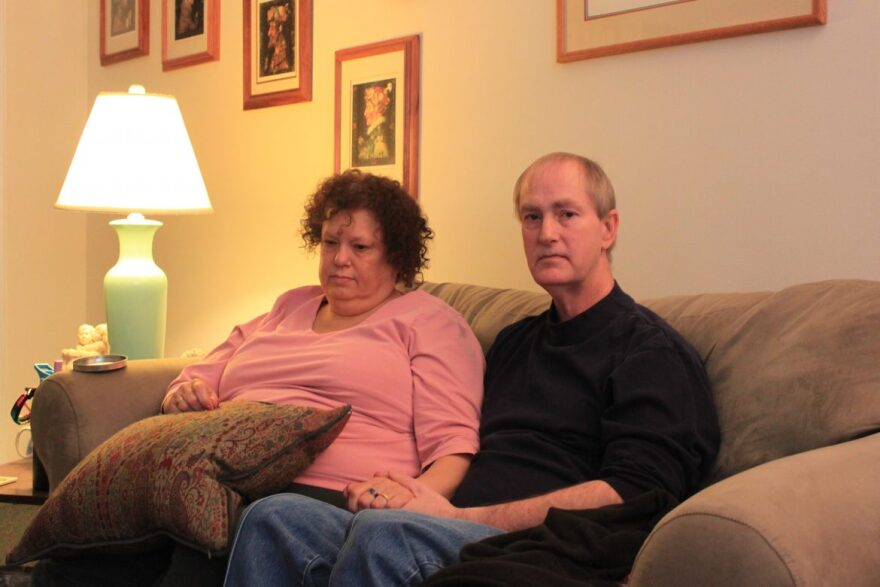This month, the Syracuse Roman Catholic Diocese hopes to release a report on how its settlement program for people who have been abused by clergy has gone.
It’s called an independent reconciliation and compensation program, or IRCP. The Syracuse Diocese covers part of Central New York and the Southern Tier including Binghamton and Cortland.
WSKG looked into how this program went for the diocese and those who participated. A listener note: this story contains graphic details of sexual abuse.
Remembering Abuse
MJ Lightbody wrote five words on an envelope and slides it across a table. ‘Those are words that I will not use. I don’t say them out loud. I can not hear people use these words."
The words: church, pray, God, God said. They’re triggers for her.
"These are because of what happened to me."
What happened to Lightbody is detailed in her testimony to the independent mediator who ran the victims compensation program for the Syracuse Diocese.
In one example, she wrote that a member of the clergy exposed himself to her in a girls bathroom in the basement of a church in Johnson City in Broome County. He made her touch, slap and stroke his penis. He put it under a hand dryer. Then, he ejaculated into a sink and yelled at Lightbody to get out. He said he was going to kill her.
This was the early 1970s. She was about ten years old.
"It was not typical, what you consider typical sexual abuse," Lightbody said. "What he did to me was ritual abuse which involves physical abuse, sexual abuse, mind control and brainwashing."

Lightbody wrote that she was tied naked to a portable chalkboard, penetrated with a rosary, and told to call her abuser daddy, father and god. He told her he asked God to forgive her for these things, but God said "no."
It’s hard for Lightbody to connect with people. She and her husband often limit themselves to what she calls "back hugs," where they wrap themselves, each in their own blanket and lay back-to-back.
Here’s what we know about her alleged abuser: his name is Paul Slavetskas. He served at Blessed Sacrament in Johnson City from March 1973 until September 1974.
Slavetskas died in 2015.
The Syracuse Diocese put his name on a list of priests with credible accusations against him. That was released in December. Lightbody’s testimony is the only known abuse claim against him.
Searching For Solutions
Last year, the Syracuse Diocese invited Lightbody and about 70 other people with known allegations of abuse against clergy to take part in the settlement program. Participants negotiated with an independent mediator, rather than the diocese itself.
"The whole point of the IRCP process, once we were able to get to it and to realize we could offer it, was for reparation, was for reconciliation, was to promote healing," said Danielle Cummings, a spokeswoman for the diocese.
Participants who chose not to hire a lawyer would meet with a pro bono attorney who would make it clear what rights each person is giving up.
Cummings said this month’s report should include some payout figures and anecdotes from people in the program. One participant donated his payout to food banks and asked every parish in the Syracuse Diocese to pray for the abusive clergy and their victims.
"He felt that the only way we’re going to be able to move forward is through healing and through forgiveness," said Cummings. "He didn’t want to take any of the funds himself. He felt the process was very healing for him."
For Lightbody, she was looking for the settlement program to provide relief that she didn’t get. Neither financially nor emotionally. She didn’t hire a lawyer, but did speak with that pro bono attorney.
The first time she went through the settlement program, Lightbody received an offer of $10,000.
She was disappointed.
Lightbody contacted the mediator who told her that more information, like therapy records, would be useful. She sent those and got another offer of $15,000.
"Makes me sick to my stomach that they think that was enough to compensate me," Lightbody said.
We don’t know if Lightbody’s total was low. Some news outlets have reported payouts in the hundreds of thousands of dollars. The payout information from the compensation program isn’t public.
Cummings said the settlement program was successful. She said abuse took place in the past that really hurt people and there’s no formula to get better.
"Nor did we say, participating in the IRCP will give you closure," Cummings continued. "What we said is we hope it begins the process of healing. We at least hope that you recognize that we feel it’s important for reparation and reconciliation and forgiveness and healing."
"For those who qualify, it is some measure of justice," said Mike Reck, an attorney who represents people who have gone through compensation programs, including in Syracuse.
"Now, it’s not full compensation," meaning what a survivor would likely get in court, according to Reck.
The IRCP did not include any sort of gag order for those who went through it. They’d be free to tell their story as they please. But there was a caveat: once a settlement is agreed upon, participants agreed to not sue the diocese in the future.
Changes To New York Law
Many people who experienced abuse decades ago couldn’t sue in New York until recent legislation. The Child Victims Act passed this year, which extends the statute of limitations to report abuse and it creates a one-year look back window for those who were previously barred to bring their case to court.
With support for the Child Victims Act swelling in recent years, the Diocese of Syracuse was criticized for running the program when it did.
"The point of the matter of saying we came up with the IRCP because we thought it was going to change, that doesn’t stand up," Cummings said, adding the Child Victims Act was proposed for more than a decade, while the IRCP was a recent development. The diocese had to make sure it was feasible to do it. Plus, she points out, the diocese came out in support of the bill after it was guaranteed it would treat both private and public institutions the same.
Back in December, when WSKG spoke to Lightbody about her experience, the Child Victims Act hadn’t passed yet, but looked like it was going to. She didn’t know much about it.
Lightbody also didn’t know if it would’ve changed anything. She didn’t like the idea of testifying in a courtroom over what happened.
She did have to keep reliving her experience. Lightbody and those around her stressed how tough the process of the settlement program was to go through. She kept looking for some validation. Validation she didn’t find.
Still, she’s clear about what she wants the public to know. "People don’t want to acknowledge that it happens, and it does. I mean it happened to me, just a little kid living down the street from you, and they need to know that."
"They need to know that it’s real," Lightbody said.
She hopes people who have experience all types of abuse, not just sexual, can gain the strength to speak out and tell their story. She hopes that can put a stop to it.
Since the Child Victims Act passed, there’s a lawsuit filed against the Archdiocese of New York, in New York City, over a compensation program that’s similar the one in Syracuse. In that, the plaintiff claims the diocese only pushed the program because they knew the Child Victims Act would one day pass.
Elsewhere in the Southern Tier and Finger Lakes, the Diocese of Rochester announced they are ending their victims compensation program because the Child Victims Act became law.







